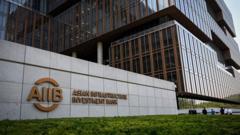1 hour ago
About sharing
The UK Treasury sent staff to work at a Chinese bank accused of being “dominated by the communist party” in the last three years, the BBC can reveal.
The Asian Infrastructure Investment Bank (AIIB) was set up in 2015 as a Beijing-based rival to the World Bank.
David Cameron’s government joined the organisation during the so-called golden era of relations between the UK and China.
Last year, Canada’s government froze activity with the AIIB after a top Canadian official there alleged the organisation was an “instrument” of the Chinese government.
And earlier on Tuesday Rishi Sunak insisted the UK’s approach to China is “more robust” than most of its allies.
He told MPs: “China represents the greatest state-based threat to our economic security.”
Bob Pickard, who had served as the bank’s global communications chief, claimed the influence of China’s ruling communist party had become too great within the bank.
Data released to the BBC under Freedom of Information laws shows the AIIB is one of a small number of overseas organisations to have seconded staff from the Treasury in the last three years.
The other overseas organisations to have benefited from similar agreements are linked to the governments of France, Ireland, Canada, the United States and the Council of Europe.
A spokesperson for the AIIB told the BBC that it takes staff on secondment from a number of its 109 member countries, including the UK.
They said “the support of such secondees is valuable to support our work addressing climate change and other development goals”.
‘Complete shock’
It comes as the UK formally accused China of being behind “malicious” cyber attacks, escalating diplomatic tensions between the two countries.
It’s not clear how many Treasury staff were seconded to the AIIB or in which of the last three years it happened.
An HM Treasury spokesperson said the UK’s membership of the AIIB “deepens economic ties with Asia and creates opportunities for British businesses”.
The spokesperson added: “We pursue secondments with a wide range of partners to further the UK’s interests.”
Conservative MP Tim Loughton, who this week was named as a victim of Chinese cyber campaigns, said the news that the Treasury had sent staff to the AIIB was a “complete shock”.
He told the BBC “there are some serious questions raised about why we’re doing it, what we’re getting out of it and what the job of people seconded actually is”.
He is calling for an audit of the UK’s relationship with the AIIB to figure out “exactly what we have got out of it, what the UK taxpayer has got out of it”.
The UK’s links with the AIIB have caused controversy in the past.
‘Sensational hype’
Former Liberal Democrat Treasury minister Sir Danny Alexander has been a vice president at the bank since 2016.
Last year Parliament’s Intelligence and Security Committee said Sir Danny’s appointment – along with the appointment of David Cameron at a separate investment fund – could have been “engineered by the Chinese state to lend credibility to Chinese investment”.
The committee said the government must not allow a situation in which security concerns were “constantly trumped by economic interest”.
It said that Russian money had previously become too embedded in society and warned that “a similar situation might be arising in relation to China”.
A spokesperson for the AIIB said the appointment of Sir Danny “was made on the basis of his considerable experience and was agreed by unanimous consent of the Bank’s board”.
When Mr Pickard quit the bank last year, he told the Financial Times that he didn’t want to be used as a “useful idiot”.
Mr Pickard, formerly the bank’s global communications chief, said members of the Chinese communist party operated “like an invisible government inside the bank”.
He urged Western countries including Canada and the UK to sever ties with the AIIB.
The Chinese embassy in Canada described Mr Pickard’s claims as “purely sensational hype and outright lies”.
The AIIB has distanced itself from the comments made by its former employee Mr Pickard.
A spokesperson for the bank pointed to a letter in the Economist newspaper that described Mr Pickard’s allegations as “personal and wild”.
